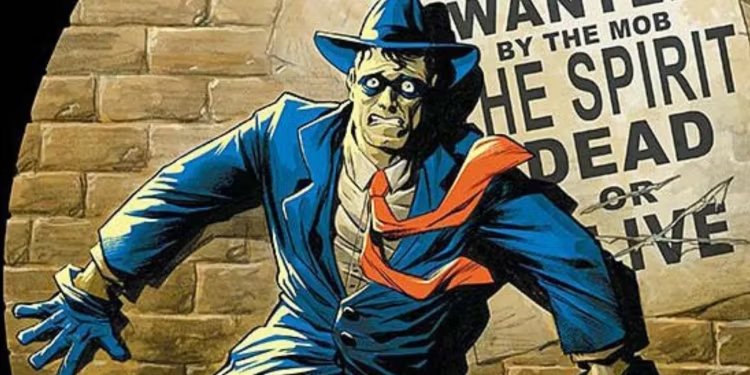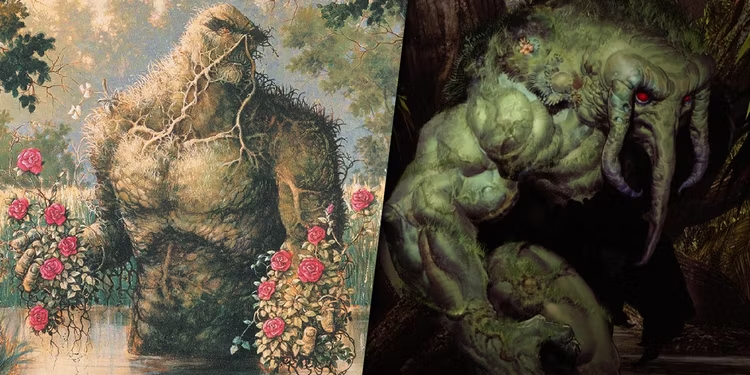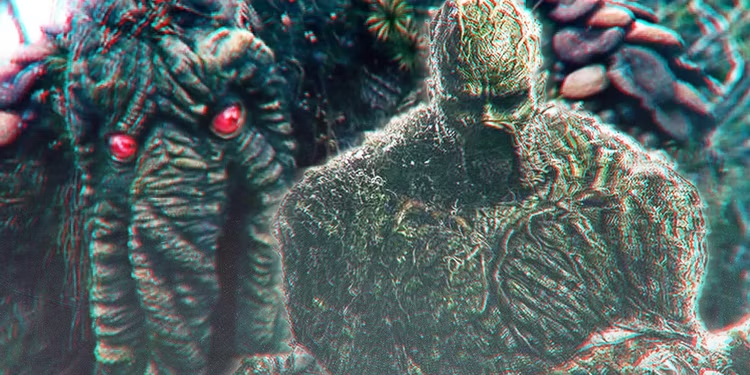Since the beginning of the comic book industry, accusations of plagiarism, stolen ideas, and blatant rip-offs have been common. One of the oldest such cases, that between Marvel's Man-Thing and DC's Swamp Thing, is actually an instance of both publishers copying the same Golden Age character. Marvel and DC have been in fierce competition with one another since the 1940s, but their rivalry truly heated up in the Silver Age.
The 1960s saw Marvel surpass DC as America's number one comic book publisher, thanks to creations like X-Men, Fantastic Four and Spider-Man. The publisher has remained number one, and the decades since included many instances were both companies rolled out very similar characters — often around the same time. The best example of this was the debut of the mossy swamp monsters, Man-Thing and Swamp Thing, who appeared mere months between each other. This has become the poster child of allegations of cross-company swiping and the debate over copying ideas and plagiarism. However, the reality is that both of these monster heroes were inspired by the Golden Age character, the Heap.
The Golden Age's Influence On Comics

The Golden Age has, since the very first comic books, had a strong impact and influence on subsequent characters, especially superheroes. A great example is how Will Eisner's Spirit helped usher in the classic fedora-wearing private detective. This directly influenced the creation of heroes like Rorschach, Mr A, Question and, arguably, even Howard the Duck. Another example of how creators unapologetically borrowed from classic comics was the incorporation of Doc Savage's Fortress of Solitude into Superman's lore. Putting it simply, countless creators have turned in their own spin on these Golden Age characters, some being identical in all but name. Whether fans see it as flattering imitation or unoriginal copying, it's very much the norm for creators to rework an older character into their own works. Each generation of writers have turned to the comics they grew up reading for influence, and there's nothing wrong with this. In fact, both Marvel and DC Comics have shown an absolute willingness to use unoriginal public domain characters, such as Dracula, Frankenstein's Monster, Sherlock Holmes, and Jekyll & Hyde. However, when it comes to newer designs that share a common inspiration, many are too quick to defend one as "original," often siding with their preferred publisher. This often happens with Man-Thing and Swamp Thing. Some have concluded that Marvel copied DC's Swamp Thing, while others was positive DC copied Marvel's Man-Thing. Neither is true. Marvel and DC actually drew inspiration from Heap in the same way George of the Jungle and Ka-Zar both copied Tarzan. Homage, imitation and, even overt copying, are fixtures of comics — and they've only become more common and tongue-in-cheek.
The Allegations Against DC

When DC debuted Swamp Thing in House of Secrets #92 (Len Wein and Bernie Wrightson), many were very quick to note how the hero was reminiscent of Marvel's Man-Thing. This even escalated to the point that Marvel considered taking legal action against DC for the overlapping concepts and design. In fact, their origin stories — one thing they don't share with Heap — became the most compelling case that DC had borrowed from Marvel. Both heroes were created when they were driven into the swamp after working on a secret formula, which was originally credited with turning them into their monster selves. That particular detail, combined with the fact Len Wein didn't delve into Swamp Thing's origin until a year later, supported the claim that DC's Swamp Thing had copied Man-Thing's origin. However, taking into account just how similar both characters were to Heap, Marvel didn't pursue legal action.
Legacy and continuing journeys has always been a cornerstone of the comic book industry, so it's no surprise that so many creators would look to the past. Considering the fact that the comic creators of the Bronze Age, such as Len Wein and Roy Thomas, had largely grown up with Golden Age comics, their creations are no coincidence. When factoring in the fact both creators have shown an aptitude for monster comics, it was only a matter of time before they created their own. In fact, Thomas (Man-Thing's co-creator) penned a 5000-word essay for the collected edition of Heap comics in 2012, proving himself to be a fan. Interestingly, a version of Heap was even created for Image Comics' Spawn series, where he sports a different, '90s-inspired monster design.
Considering the fact some of Heap's stories were reprinted in 1971 — the very same year of Man-Thing and Swamp Thing's creation — the pieces of the puzzle become clear. It's incredibly likely both Wein and Thomas (or editors at the company) caught wind of this Golden Age reprint and decided to try to cash in on the idea of a nature-based, monster hero. This, perhaps better than anything, explains how both companies rolled out two very similar characters around the same time. Just as current writers jump on trends, popular ideas, and nostalgia, so too did the generations of older comic book writers, especially when it was something that resonated with their own tastes.
Man-Thing, Swamp Thing And The Heap

Heap was created in 1942, by Harry Stein and Mort Leav for the comic Air Fighters #3, published by Hillman Periodicals. His story was that of a German World War I "flying ace," Baron Eric von Emmelman, who was shot down and crashed in a Polish swamp. However, the man refused to die and clung to life as strongly as he could. Through his sheer force of will power and the intervention of the goddess of nature, Ceres, Emmelman's body was slowly transformed into part of the swamp. When his transformation was complete, he had become the moss-encrusted monster, the Heap. Various aspects of the Heap's design and story can be seen in both Swamp Thing and Man-Thing. These details include the Heap's ties to a swamp, his connection to the "Greenworld," and his facial design. Essentially, both Roy Thomas and Len Wein got to put their own spin on the Heap, a hero popular during their youth.
If anything, the comparison between Heap, Man-Thing and Swamp Thing reveals DC's mucky hero to be the more unique, especially when considering Man-Thing is nearly identical to Heap. Where Swamp Thing is a mossy man who can still speak and has the mind of a human, Man-Thing and Heap share a more monstrous, animalistic design. More to the point, DC did a better job of distinguishing Swamp Thing from the other two, especially when Alan Moore jumped on the title. Swamp Thing's story slowly evolved from a Universal Monsters homage towards a supernatural lore and ascension to near-godhood. Despite Man-Thing and Swamp Thing having a common predecessor, they've both taken on distinct identities of their own in the decades that followed.
Both Heroes Became More Distinct

Whether it was to avoid further accusations of theft or the simple fact of different creative visions, Man-Thing and Swamp Thing have become evermore divergent from one another. Horror remained a common theme in both heroes' stories, but Man-Thing morphed into an obscure fantasy-themed hero. Meanwhile, Swamp Thing delved deeper into Gothic horror and the supernatural, with a strong touch of science fiction. Swamp Thing's defining writer, Alan Moore, gave him a tale of tragedy, romance, and an odyssey-inspired journey through the universe that eclipsed Man-Thing's story. The Heap, largely due to the style of story of the Golden Age, never received such a compelling or fantastical story.
While both heroes have become great storytelling resources for DC and Marvel's writers to tap into, Swamp Thing has surpassed both Man-Thing and the Heap. To whatever extent Swamp Thing's story may have borrowed from Man-Thing, it's clear that DC's hero has something Marvel simply can't figure out for its own version. Whether it's Swamp Thing's ability to converse with other heroes, his more active role in the DCU, or his supporting cast of heroes, he has resonated with readers incredibly well. Arguably, it was the decision to let Swamp Thing maintain his humanity and mind that gave him his most compelling and relatable stories.
Comments